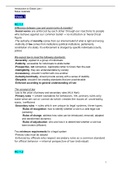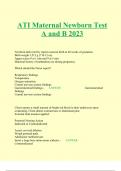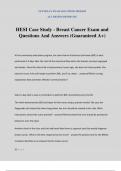1. Introduction: the use of laboratory animals
Question 1: Give the three R’s , explain and give an example for each.
REPLACEMENT: There is no need of using laboratory animals if a successful
experiment can be carried out with
In vitro models (eg human multilayered corneal cell model for toxicity studies, …)
Computerized models, videos, film
Use of plastic soft-tissue organ models instead of real animals (eg for taking blood
samples in the tail of the rat to practice, cut and suture in surgery)
OR the replacement of vertebrate animals with less sentient animals (invertebrate
animals such as worms, bacteria etc.)
REDUCTION: reduce the number of animals used without loss of useful information.
This is achieved by
EG. Replacement of the LD50 toxicity (200 animals needed) with the limit test (6-10
animals)
Animal sharing (eg animal that is euthanized can still be used for surgery practice)
Improved statistical design (eg reduce the number of variables through good
experimental design by using genetically homogenous animals or by ensuring that
the conditions of the experiment are rigorously controlled)
Better quality animals (eg animals that are in good health: less animal loss + less
intercurrent diseases which reduces the mortality rate)
REFINEMENT: optimize the conditions of the laboratory animal experiment so that the
animal experiences less pain, distress and other adverse effects. Enhancement of the
animal well-being.
EG. Refinement of the Draize test ( eye irritancy test to shampoos etc.) by using a tenth
of the amount of the substance used => reduction of pain, discomfort and more
predictive because it more simulates human experience.
Better techniques, equipment, use of smaller sample sizes => no euthanasia
needed
Computerized models => screen a substance for irritancy before performed on
lab animals
Proper handling of animals
, Proper housing of animals with all animal needs supplied (space, environmental
enrichment). Eg. New caging allow monkeys to live in groups, reducing the stress
level in these highly social animals.
ICLAS: International Council for Laboratory Animal Science
Aim: enhance international collaboration in the field of laboratory animal science
2. Taxonomy of vertebrates
Taxonomy = Classification into hierarchically nested groups based on shared characteristics and
giving names to those groups
Fylogenie = de studie van de ontstaansgeschiedenis van een groep organismen, hoe de ene groep uit
de andere is ontstaan
Linnaen taxonomy = Classification into groups based on morfologische eigenschappen (polytomous
subdivision + paraphyletic grouping allowed; one ancestor of the taxon can have more descendants
belonging to other taxa)
Cladistics = Classification into groups based on one or more shared characteristics that come from
the group’s last common ancestor (dichotomous subdivision + monophyletic grouping; single
ancestor for all members of the clade )
Question 1: Give the taxonomic classification of the rabbit, mouse, guinea pig,
dog, rhesus monkey and monkey or sheep.
a) RABBIT
Unranked: Glires
Order: Lagomorpha (lagos: hair)
Family: Leporidae (lepus: hair)
Genus: Oryctolagus
Species: Oryctolagus cuniculus
Toepassing: antiserum productie, alternatief rodents, eye irritancy
b) MOUSE
Order: Rodentia
Suborder: Myomorpha (old world rodents: fast breeders, born naked)
Superfamily: Muroidea
Family: Muridae
Subfamily: Murinae
Genus: Mus
Species: Mus musculus
, Toepassing : multipurpose animal model (ease of maintenance and handling, fast reproduction, fully
sequenced genome)
c) GUINEA PIG
Order: Rodentia
Suborder: Hystricomorpha (Hystrix: jaw) (New world rodents: born with hair)
Superfamily: Cavioidea
Family: Caviidae
Subfamily: Caviinae
Genus: cavia
Species: cavia porcellus
Toepassing: vitamin c en foliumzuur dependency, gelijkaardig immuunsysteem
d) Rhesus Monkey
Order: Primates
Suborder: Haplorrhini (haplo rhinos: single nose)
Infraorder: Simiiformes (simius: ape, monkey)
Parvorder: Catarrhini (kata rhinos: downward nose)
Superfamily: Cercopithecoidea
Family: Cercopithecidae (monkey with tail: old world monkeys)
Genus: macaca
Species: macaca mulatta OF macaca fascicularis
e) Chimpanzee
Order: Primates
Suborder: Haplorrhini (haplo rhinos: single nose)
Infraorder: Simiiformes (simius: ape, monkey)
Parvorder: Catarrhini (kata rhinos: downward nose)
Superfamily: Hominidae
Subfamily : Homininae
Genus : pan
Species : pan troglodytes
Species : pan paniscus (bonobo)
f) Varken
Order: Artiodactyla
Suborder: Suina
Family : Suinae
Tribe : suini
Genus : sus
Species: sus scrofa
Subspecies: sus scrofa domestica





